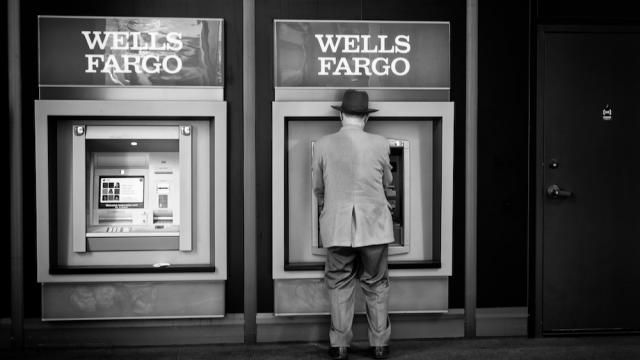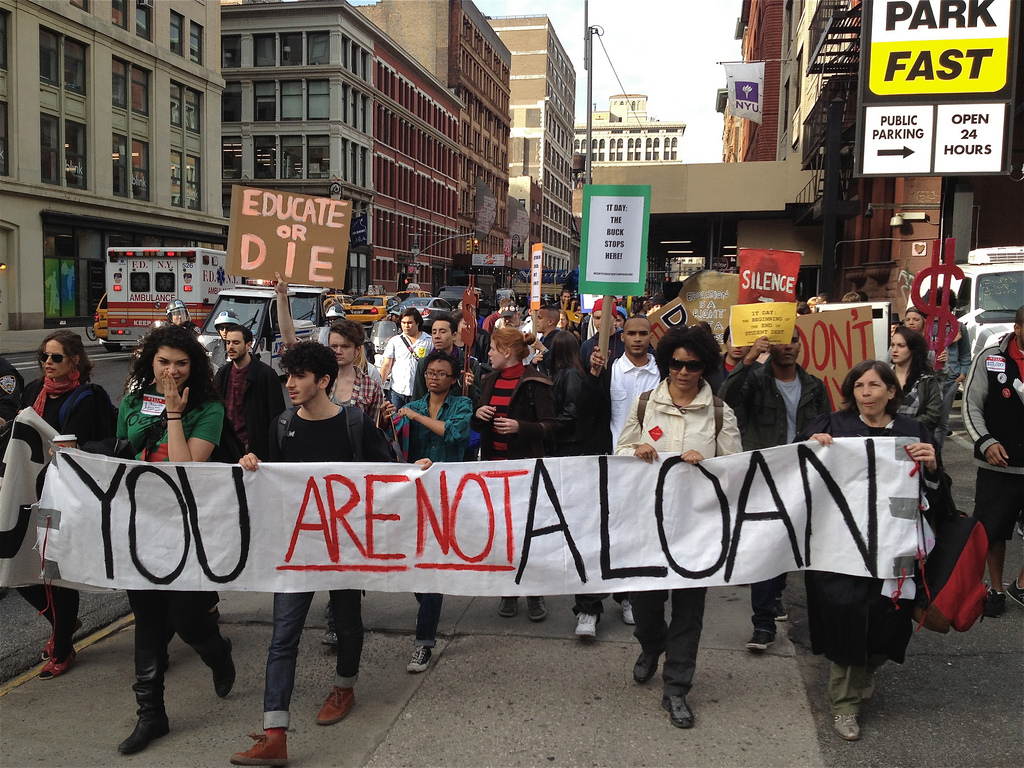
Money, as Karl Marx lamented, plays the largest part in determining the course of history. Once speculators are able to concentrate wealth into their hands they have, throughout history, emasculated government, turned the press into lap dogs and courtiers, corrupted the courts and hollowed out public institutions, including universities, to justify their looting and greed.
Today’s speculators have created grotesque financial mechanisms, from usurious interest rates on loans to legalized accounting fraud, to plunge the masses into crippling forms of debt peonage. They steal staggering sums of public funds, such as the $85 billion of mortgage-backed securities and bonds, many of them toxic, that they unload each month on the Federal Reserve in return for cash. And when the public attempts to finance public-works projects they extract billions of dollars through wildly inflated interest rates.
Speculators at megabanks or investment firms such as Goldman Sachs are not, in a strict sense, capitalists. They do not make money from the means of production. Rather, they ignore or rewrite the law—ostensibly put in place to protect the vulnerable from the powerful—to steal from everyone, including their shareholders. They are parasites. They feed off the carcass of industrial capitalism. They produce nothing. They make nothing. They just manipulate money. Speculation in the 17th century was a crime. Speculators were hanged.
We can wrest back control of our economy, and finally our political system, from corporate speculators only by building local movements that decentralize economic power through the creation of hundreds of publicly owned state, county and city banks.
The establishment of city, regional and state banks, such as the state public bank in North Dakota, permits localities to invest money in community projects rather than hand it to speculators. It keeps property and sales taxes, along with payrolls for public employees and pension funds, from lining the pockets of speculators such as Jamie Dimon and Lloyd Blankfein. Money, instead of engorging the bank accounts of the few, is leveraged to fund schools, restore infrastructure, sustain systems of mass transit and develop energy self-reliance.
The Public Banking Institute, founded by Ellen Brown, the author of “Web of Debt: The Shocking Truth About Our Money System and How We Can Break Free,” Marc Armstrong and other grass-roots activists are attempting to build a system of public banks. States such as Vermont and Washington and cities such as Philadelphia, Washington, D.C., San Francisco and Reading, Penn., have begun public banking initiatives.
Public banks return economic power, and by extension political power, to the citizens. And because they are local they are possible. These and other grass-roots revolts, including sustainable agriculture, will be the brush fires that will, if they succeed, ignite the overthrow of the corporate state.
“The debate about public or private control of the monetary system has been going on for hundreds of years,” Armstrong, the executive director of the Public Banking Institute, said when I reached him by phone. “The American Revolution had everything to do with who controlled our economic destiny. The money supply is central to that control. North Dakota has proven that a state can use a public bank to further the economic interests of its people. North Dakota funds its own infrastructure and capital investment projects. It provides funding for commercial lending throughout the state. It develops the areas of its economy it wants to prioritize, areas that are often not funded by private banks.”
“When a public bank such as the bank in North Dakota funds infrastructure projects the interest costs, which [otherwise] are often 50 percent or more of a project, in essence fall to zero because the interest is returned to same people who own the bank and paid the interest in the first place,” said Armstrong, who previously worked for IBM Finance.
“[Americans typically] hold labor costs under a microscope, but ... don’t hold interest costs under a microscope. North Dakota can offer commercial loans as low as 1 percent. Compare this with Wall Street banks that charge 14 or 15 percent. We can use bank credit, the tool Wall Street banks use to amass wealth and power, to empower ourselves.” And because credit, Armstrong notes, is the source for 97 percent of the nation’s money supply, this power would be huge.
The Bank of North Dakota, the vision of socialists from a century ago, has been in operation for 90 years. It offers the state’s farmers and businesses low interest rates on loans. After floods destroyed much of Grand Forks in 1997 the bank provided a six-month moratorium on mortgage payments and gave low-interest loans to the community to rebuild, a sharp contrast with the raw exploitation that marked the arrival of Wall Street bankers and speculators in Gulf Coast areas hit by Hurricane Katrina. Public banks in the United States, like the public banks in Germany, fund things such as solar power because it is good for communities rather than the portfolios of speculators.
Public banks also protect us from the worst forms of predatory capitalism. Reporters Trey Bundy and Shane Shifflett last January wrote in the San Francisco Chronicle on how one of Wall Street’s numerous scams works. When the Napa Valley Unified School District in California needed funds in 2009 to build a high school in American Canyon it took out a $22 million loan with no payments due for 21 years. “By 2049, when the debt is paid,” the paper noted, “the $22 million loan will have cost taxpayers $154 million—seven times the amount borrowed.”
And Napa, the paper reported, is one of at least 1,350 school districts and government agencies across the nation that have engaged in this form of borrowing, called capital appreciation bonds, to finance major projects. Capital appreciation bonds mean billions in debt for the public and hundreds of millions of dollars for the speculators, the reporters pointed out. And this kind of scam is writ large across the entire society.
“California public schools received $9 billion in loans over the last seven years,” said Armstrong, who is from California. “In 25 to 30 years the interest due on that $9 billion will be $27 billion. This is just one example of the massive societal crisis being caused by big banks. Wall Street investment banks should not be permitted to handle public financing, which has become simply another way for Wall Street to monetize and extract our nation’s wealth.”
The potential windfall for communities through the establishment of public banks is huge. In a study prepared in Vermont in support of establishing a public bank it was estimated that a public bank could make loans equal to 66 percent of state funds on deposits, or $236.2 million in credit for economic development in the state. This would expand the total credit supply available for state lending agencies by $236.2 million.
Furthermore, the credit would be at a low cost to the state because public banks do not have to borrow money by selling bonds. Public banks make loans based on deposits. Interest returns to the state on loans and deposits. In essence, the state lends money to itself. The availability of $236.2 million in new lending, the study estimates, would create 2,535 new jobs, $192 million in value added (gross state product) and a $342 million increase in state output.
“If used to finance state capital expenditures, funding through a public bank could save close to $100 million in interest costs on [fiscal year] 2012-13 capital spending, due to most interest payments no longer leaving the state,” the report says.
U.S. Sen. Bernie Sanders of Vermont and U.S. Rep. Peter DeFazio of Oregon have called for a national infrastructure bank. The U.S. Postal Service would fund the proposed bank. The Postal Service—which from 1911 until 1967 provided basic checking and savings services to the public—with its offices in nearly every community has the physical infrastructure to jump-start a national public bank. Deposits would be invested in government securities. These securities would be used to finance infrastructure projects.
And the proposal would not require raising taxes. The plan, which I doubt the banking lobbyists and their lackeys in Congress will ever permit, would in addition to saving the Postal Service itself provide access to banking for the one in four households that cannot get such services.
We won’t be saved by anyone in Washington. We will have to save ourselves. We will have to transform our communities, cities and states into places where the consent of the governed is no longer a joke. We will have to take back power, which in a corporate state is financial power, from the venal class of speculators who hold us hostage. In open defiance we will have to build our own independent institutions. Of course the speculators will fight back. And they will fight dirty—they know the consequences of this revolt. Public banks are not just about the economy. They are about liberty.
3 WAYS TO SHOW YOUR SUPPORT
- Log in to post comments














